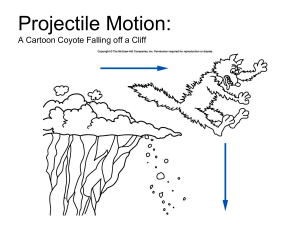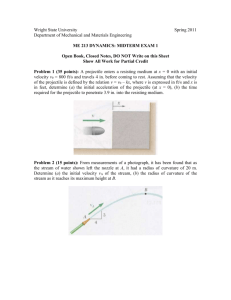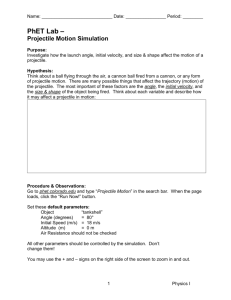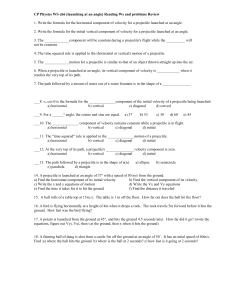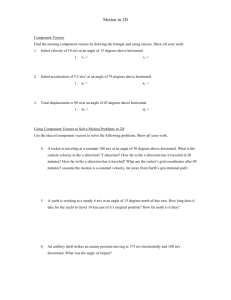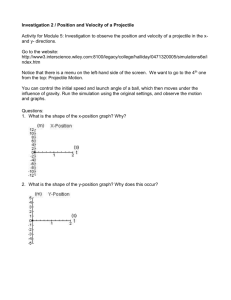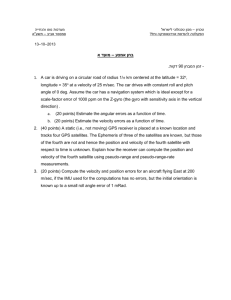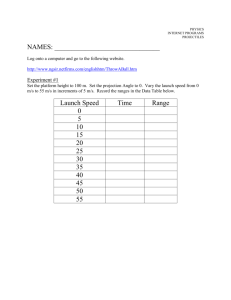Physics
advertisement
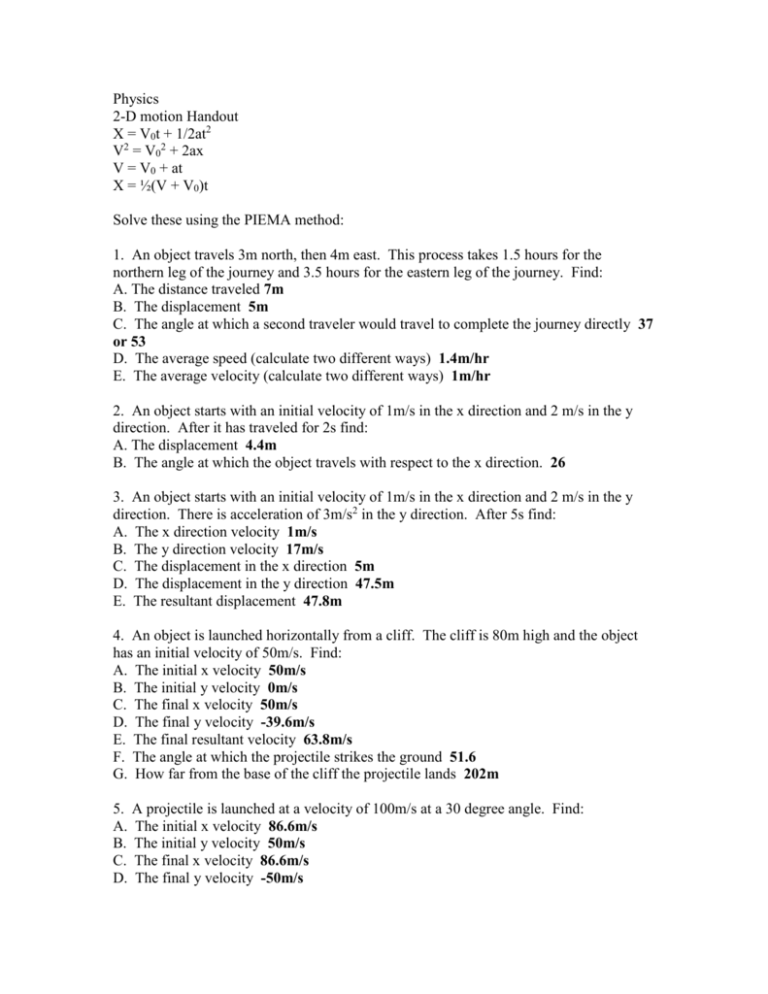
Physics 2-D motion Handout X = V0t + 1/2at2 V2 = V02 + 2ax V = V0 + at X = ½(V + V0)t Solve these using the PIEMA method: 1. An object travels 3m north, then 4m east. This process takes 1.5 hours for the northern leg of the journey and 3.5 hours for the eastern leg of the journey. Find: A. The distance traveled 7m B. The displacement 5m C. The angle at which a second traveler would travel to complete the journey directly 37 or 53 D. The average speed (calculate two different ways) 1.4m/hr E. The average velocity (calculate two different ways) 1m/hr 2. An object starts with an initial velocity of 1m/s in the x direction and 2 m/s in the y direction. After it has traveled for 2s find: A. The displacement 4.4m B. The angle at which the object travels with respect to the x direction. 26 3. An object starts with an initial velocity of 1m/s in the x direction and 2 m/s in the y direction. There is acceleration of 3m/s2 in the y direction. After 5s find: A. The x direction velocity 1m/s B. The y direction velocity 17m/s C. The displacement in the x direction 5m D. The displacement in the y direction 47.5m E. The resultant displacement 47.8m 4. An object is launched horizontally from a cliff. The cliff is 80m high and the object has an initial velocity of 50m/s. Find: A. The initial x velocity 50m/s B. The initial y velocity 0m/s C. The final x velocity 50m/s D. The final y velocity -39.6m/s E. The final resultant velocity 63.8m/s F. The angle at which the projectile strikes the ground 51.6 G. How far from the base of the cliff the projectile lands 202m 5. A projectile is launched at a velocity of 100m/s at a 30 degree angle. Find: A. The initial x velocity 86.6m/s B. The initial y velocity 50m/s C. The final x velocity 86.6m/s D. The final y velocity -50m/s E. The final resultant velocity 100m/s F. The angle at which the projectile strikes the ground 30 degrees G. The time of flight 10.2s H. The time to reach apogee 5.1s I. The maximum height reached 127.5m J. The range of the projectile 780m 6. A pool ball leaves a 0.60-meter high table with an initial horizontal velocity of 2.4 m/s. Predict the time required for the pool ball to fall to the ground and the horizontal distance between the table's edge and the ball's landing location. .84m 7. A soccer ball is kicked horizontally off a 22.0-meter high hill and lands a distance of 35.0 meters from the edge of the hill. Determine the initial horizontal velocity of the soccer ball. 16.7m/s 8. A football is kicked with an initial velocity of 25 m/s at an angle of 45-degrees with the horizontal. Determine the time of flight, the horizontal distance, and the peak height of the football. 3.6s, 63.7m, 15.9m 9. A long jumper leaves the ground with an initial velocity of 12 m/s at an angle of 28degrees above the horizontal. Determine the time of flight, the horizontal distance, and the peak height of the long-jumper. 1.15s, 12.1m, 1.62m 10. A ball is launched into the air at an angle of 32.0 o with an initial speed of 18.0 m/s. Neglecting air resistance, determine how long the ball will be in the air. 1.95s 11. A ball is tossed into the air at a speed of 64.0 m/s at an unknown angle. If the ball is observed to rise to a maximum height of 7.80 m, at what angle was the ball thrown relative to the ground ? 11.1 12. An object is launched from the ground into the air at an angle of 38.0 o (above the horizon) towards a vertical brick wall that is 15.0 m horizontally from the launch point. If the ball takes 1.30 seconds to collide with the wall, with what speed was the ball launched ? 14.6m/s 13. A tiger leaps horizontally from a 6.5m high rock with a velocity of 3.5m/s in the horizontal direction. How far from the rock will the tiger land? 4.03m 14. A ball is thrown horizontally from the roof of a building 45.0m tall and it lands 24.0m from the base. What is the ball’s initial velocity? 7.9m/s 15. A boat can travel 2.30m/s in still water. If the boat travels across a stream whose current is 1.20m/s what is the boat’s velocity (magnitude and direction) compared to the shore? What will be the position of the boat after 3.00s? 2.6m/s, 7.8m 16. An airplane is heading due south at 600.0km/h. The wind is blowing from the southwest at a speed of 100.0km/h. Calculate the velocity (magnitude and direction) of the plane relative to the ground, and how far from its intended position it will be if the pilot takes no corrective action. 534m/s off by 100km each hour 17. A projectile is launched with a velocity of 100.0m/s at an angle of 35.0 degrees above the horizontal. What is its range? 958m 18. What is the time of flight of the projectile in problem 17? 11.7s 19. What is the maximum height reached by the projectile in problem 17? 168m 20. A projectile launched with a velocity of 200.0m/s has a maximum height of 100.0m. What angle was it launched at? 12.7 21. What is the range of the projectile in problem 20? 1750m 22. What is the time of flight of the projectile in problem 20? 8.96s 23. A projectile is launched at a 40.0 degree angle at some velocity. What angle will give the same range at the same velocity? Which angle gives a higher maximum height? Which angle gives a longer time of flight? 50 degrees, 50 degrees, 50 degrees 24. Which has a longer range, a projectile launched at 40.0 degrees and 100.0m/s or a projectile launched at 70 degrees and 220m/s? 25. An object is launched horizontally off a 100.0m cliff at a velocity of 50.0m/s. Find the angle at which it strikes the ground. 48.6 26. An object is launched at 250.0m/s at a 30.0 degree angle aimed at a 1000.0m high cliff. If the launcher is 400.0m away from the cliff, at what angle does the object strike the cliff? 63.7 27. Retry problem 26 when the launcher is 3000.0m away from the cliff. 2.86 28. A cannonball is shot at an angle. The initial resultant velocity is 250m/s. The initial x direction velocity is 100m/s. Find the angle the cannonball was fired. 66.4 29. Find the maximum height reached by the cannonball in problem 28. 2675m 30. Find the time of flight of the cannonball in problem 28. 46.7s 31. Find the range of the cannonball in problem 28. 4675m 32. A cannon has a velocity of 100m/s. What angle must a cannonball be fired at in order to have a time of flight of 5s? 14.2 degrees 33. What is the range of the cannon in problem 32? 485m 34. At what angle should the cannon in problem 32 be aimed at in order to give the greatest range? What would the range be? 45 degrees, 1020m 35. Some knights laying siege to a castle position their catapult 400m from the castle wall. They can’t move closer because they will be within arrow range of the castle. The knights know if they launch the projectile at a 30 degree angle they will hit the target inside the castle. However, the castle wall is high enough to block the projectile. What can the knights do to launch the projectile over the wall but still hit the target? Launch at 60 degrees 36. A projectile is launched at 1000m/s at angle of 30 degrees. If the angle is changed to 60 degrees what must the velocity be in order to have the same time of flight? 577m/s 37. A projectile is propelled horizontally off a cliff. The cliff is 100m high and the projectile lands at an angle of 15 degrees above the horizontal. What was the initial velocity? 165m/s 38. A projectile is launched horizontally from a cliff. Its final resultant velocity is 100m/s. The cliff is 30m high. What was the initial velocity? 97m/s 39. A projectile is launched at 45 degrees. It reaches its highest point in 10s. Find its initial velocity. 139m/s 40. A projectile is launched at a 30 degree angle. It reaches a height of 50m. Find the initial velocity. 62.6m/s
